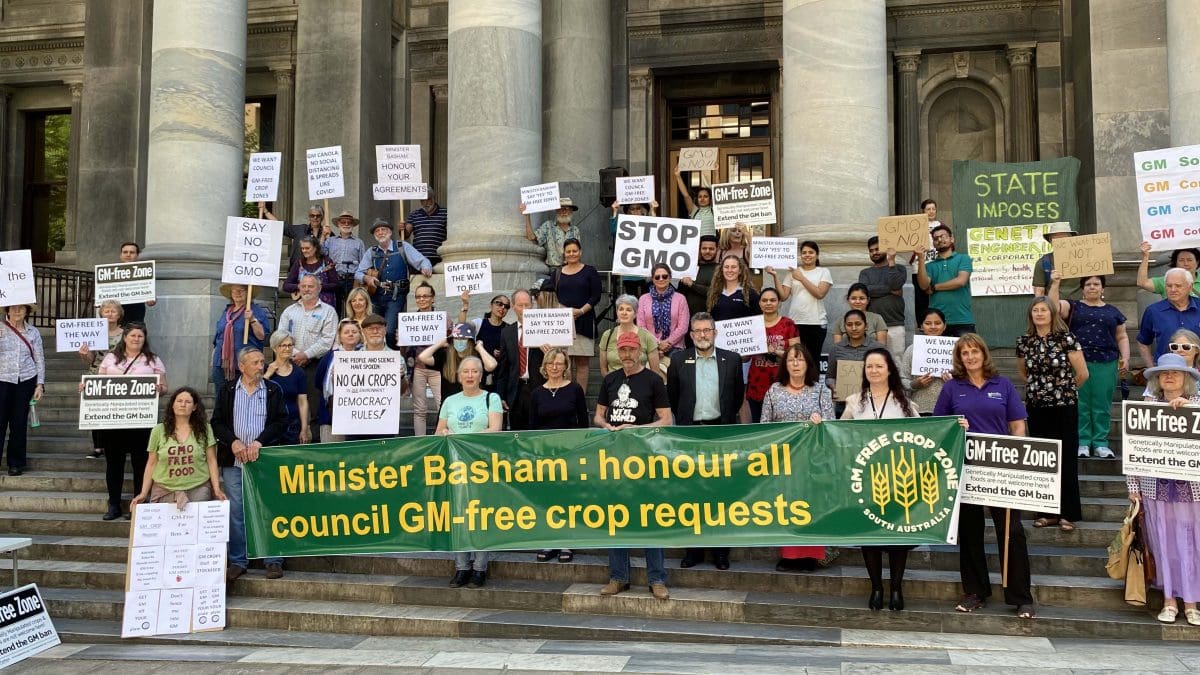
Those in support of allowing some growing regions of South Australia to remain GM free gathered at SA’s Parliament House today. Photo: Gene Ethics
TEN local government areas (LGAs) in South Australia are applying to retain a GM-free status ahead of the SA Government allowing its farmers to grow GM crops including canola.
The Adelaide Hills, Mt Barker, Barossa, Onkaparinga, Yankalilla, Playford, Alexandrina, Victor Harbor, Berri Barmera, and Gawler Councils have all applied to be GM-free on market and trade grounds.
If granted, the exemptions would put these LGAs on the same footing as Kangaroo Island.
“We gather at parliament to insist that David Basham, the Minister for Primary Industries, approves all the applications he receives from councils for their GM-free crop-zone status to be restored, as Kangaroo Island’s is,” farmer Dr Catherine Harvey said.
“Regional economies and the whole state can continue to benefit greatly from the competitive advantage and premium prices to be earned from SA’s GM-free foods and beverages sold throughout Australia and overseas.”
SA Opposition member, Tony Piccolo, is the Member for Light, which includes the acclaimed wine-growing Barossa region.
“The Barossa Council have clearly decided to take this opportunity to create a GM free zone to protect the international brand of the Barossa and support local jobs
and businesses critical to the region’s post COVID-19 economic recovery,” Mr Piccolo said in an October 2 statement.
“A number of councils have acted upon the opportunity to opt out of allowing GM crops in their areas.
“In my own region, the town of Gawler, Light Regional Council and the Barossa Council have all decided or requested that all or part of their council areas should remain GM free.
“These councils have consulted with their communities and their decision to opt out is based on community opinion within their council areas.”
Mr Piccolo acknowledged that some farmers who crop canola in the Barossa region could be affected by the decision, but if the Barossa region lost its GM status it could
do untold damage to the Barossa brand.
“This is not an argument about science but rather the need to protect the green and clean reputation the Barossa enjoys.
“It is a fine balancing act, but at this stage I think the risks of ditching the GM Free status are greater than the potential benefits.”
SA Greens Member of the Legislative Council Mark Parnell unsuccessfully voted to keep the SA GM crop moratorium in place, and also sponsored several bills to compensate farmers for GM contamination if the GM crop ban were lifted.
“Back in May, the Marshall Liberal Government passed new laws giving councils the responsibility to consult with their communities and decide whether they want their council area to be GM-free.
“The Minister for Primary Industries must now honour the democratic decisions of the councils that have applied in good faith to be GM-free, and approve their applications,” Mr Parnell said.
Other LGAs may also still apply for a GM exemption.
Source: Gene Ethics, Tony Piccolo MLC


You have asked Local Governments what they want; after wide and thoughtful consultation with their communities 10 LGAs have voted to stay GM free. To retain any credibility with the SA community the State Government must take on board the wishes of those communities and Councils who have give such considerable thought and consultation to this issue
The consideration given to Kangaroo Island to remain GM-free because losing that status would hurt their contracts with overseas buyers should be extended to the ten councils who have applied to be GM-free, for the very same reason. What is the difference? Millions of dollars could be lost to our economy if those areas are no longer GM-free, not to mention many businesses ruined and jobs lost, particularly in the wine industry. How could it hurt the rest of the State’s farmers if those ten councils were GM-free? The government is being motivated by ideology, not common sense.
The requesting councils have nothing to gain from the GM varieties available in Australia and a lot to lose. The councils are to be applauded for taking a prudent approach. Given that they have conducted the enquiries and reached logical conclusions for their communities, the government must heed their requests and put in place effective segregation policies that prevent the undermining of their Non-GM status at State expense
Farmers who think they will be better off with GM crops have been sold the biggest con in Australian Agricultural History!
Why would you if you’re a business person and agriculture is big business produce a product that consumers don’t want?
Why would you grow GM Canola when its discounted by between $50-$90/tonne depending on receival location?
Our major international trading partners have made it clear they won’t buy GM and will insist on zero GM contamination.
I am sorry for the South Australian farmers, who are already down $30M in recent years because of the GM ban in that State. This is despite tens of millions of hectares of GM crops now grown world wide. To quote a popular statement by many scientists these days –
“When truth is blurred by lies and misinformation, perception becomes reality and all is lost.” What people perceive is usually what they believe, and this is based on what they hear, see and think. … This person is creating his own perception by creating a false illusion.”